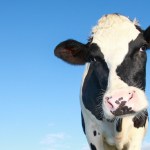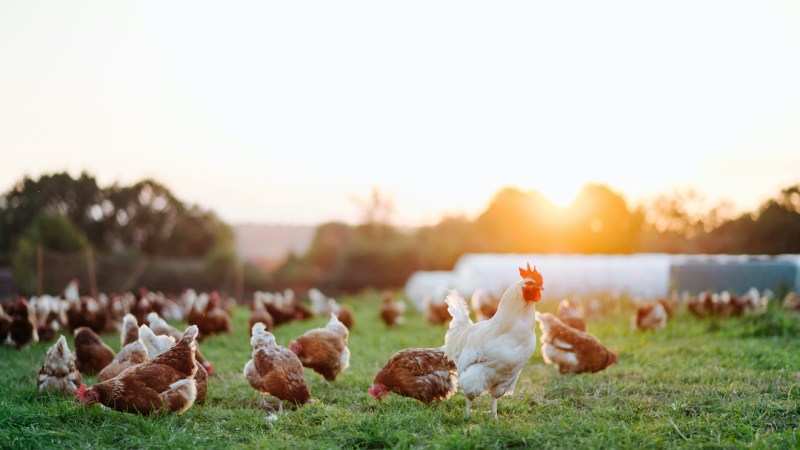When Australians were forced to close their doors on the outside world and isolate themselves…
The future is bright for our dairy industry
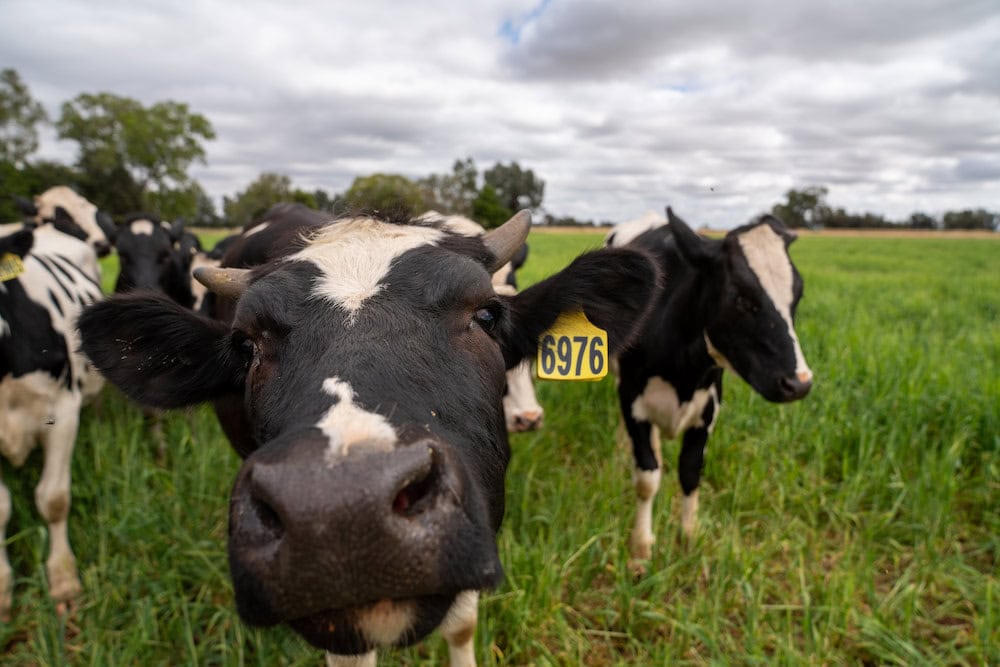
It’s been a while since confidence, optimism and certainty were used to describe the dairy industry as low milk prices, price clawbacks, the $1 a litre era, drought, and bushfires forced many out of the industry. But it appears the sector is rounding the bend.
The economics of supply and demand are favouring dairy farmers, the Australian dollar has settled and a mandatory Dairy Code of Conduct which was introduced in January 2020 is giving farmers a stronger voice in processor contract negotiations.
Long-term minimum price contracts are increasing the appetite for investment.
Favourable seasonal conditions are boosting production. Dairy Australia figures show New South Wales dairy farmers bucked a national trend with milk production up around three per cent in the first three months of the 2021/22 financial year.
If this continues, NSW will outstrip the national average which Dairy Australia predicts will rise by up to two per cent, with 8.8 to 9 billion litres forecast for the national milk pool.
Global and domestic demand is strong and farmgate prices are up.

Stock feed is plentiful and cheap, although higher grain and fertiliser costs are offsetting these gains. Labour shortages continue to be an issue, as is concern about mice and disease impacting crop yields.
Whilst times are good, the spectre of the hard times hover and that is why NSW Farmers is overhauling its Dairy Committee and recruiting a dedicated Dairy Manager who will ensure the issues of dairy farmers are prosecuted at a state and national level.
A good change for us
Malcolm Holm is a multi-generational dairy farmer at Finley in the Riverina region. He’s also the Vice Chairman of the NSW Farmers Dairy Committee and sits on the Australian Dairy Farmers National Council.
He witnessed firsthand the difficulties dairy farmers faced as the compound effect of years of low prices meant they didn’t have the financial strength to survive the drought.
Thankfully this is changing.
“We are still seeing people exiting the industry, but we are seeing existing farmers who are wanting to grow and expand,” Malcolm says.
“In this area we’ve had two or three large sheds go up and farmers are continuing to expand their herd. This is probably reflected by the strong market for dairy cattle but even though the cow prices are high, there is also an equally strong demand for dairy cattle.”
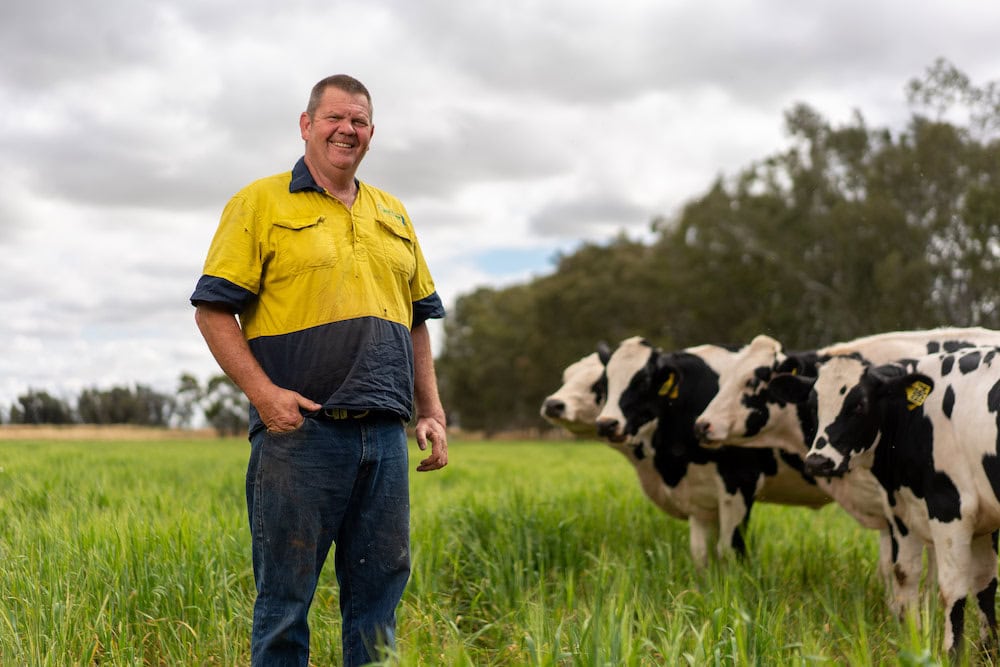
Labour shortages exacerbated by COVID-19 remain a key issue, along with higher input costs and delays in receiving machinery and other supplies. But conversely Malcolm’s farm and others in his region have received a full water allocation which helps offset these costs.
“In real terms dairy farmers in the southern milk pool are now seeing a 33 per cent increase in the price of milk. We’ve gone from 2016 where every litre of milk was being produced at a loss to now actually having some reasonable margins,” Malcolm says.
“It is challenging as those inputs are now starting to bite, but there is positive cash coming through our businesses now. I think the mandatory code has half stopped all the pricing games that used to happen. There is still a bit of that going on, but there is a lot less of it.
Malcolm Holm, multi-generational dairy farmer at Finley in the Riverina region.
“Dairy farmers know on the first of July how much they are going to get, whereas previously they might not have known the minimum price their processor was going to pay until the end of July which made it very difficult for them.”
Malcolm says the turnaround is a welcome change after some tough years.
“We’ve got full allocations of water so that sets a good base for us and there has also been good quality silage, the cows are producing well, and milk prices are pretty reasonable,” he says.
“Labour continues to be a worry and I think some of the input prices around fertilisers and chemicals have increased, but this is being offset by lower water prices, so the cost of growing summer crops is similar to last year.
“Having said all of that, this is still one of the better times in the last 10 years so things are looking pretty good which is a good change for us.”
NSW Farmers Dairy Committee chair Colin Thompson acknowledges there are positives in the industry but says there’s no time to rest in supporting farmers to ensure the right operating settings are in place.

“Seasonal conditions have played a big role in the turnaround, and we are seeing reasonable and good milk prices, but we still have the impacts of $1 milk and unfair competition in terms of supermarket monopolies,” he says.
“These issues tend to subside, and other areas improve, but they are still there, and they are still very real. They are still things we have to do deal with.”
Australian Dairy Farmers CEO David Inall notes a lift in optimism, but adds this doesn’t mean hard times will not return.
“We do get a sense that most farmers are feeling quite upbeat about the season and about prices and this is all very good for confidence which provides some impetus for investment and growth,” he says.
“But there are still pressures out there, particularly fertiliser out of China is becoming very expensive. Labour is also a big concern. We would be looking for government support to stimulate labour back into the dairy industry. There is always work to be done and we never want to lose sight of that.”
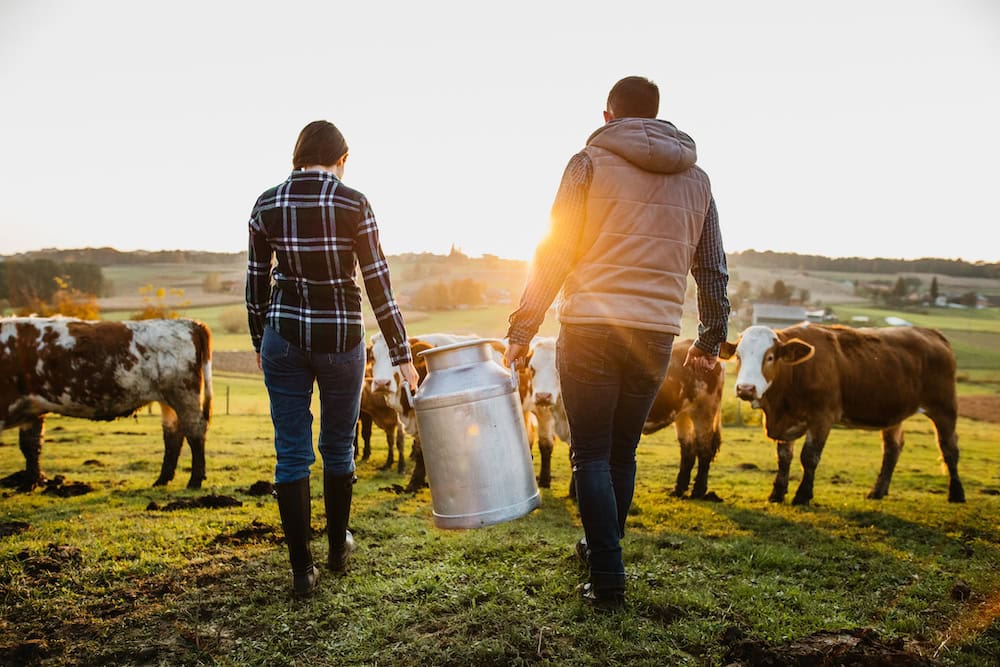
Bega Cheese triumph
ASX-listed dairy processor, Bega Cheese, has triumphed through the hard times.
In February 2021 it acquired Lion Dairy and Drinks from Kirin Holdings for $534 million and added Farmers Union and Dairy Farmers branded milk, chilled juice, and yoghurt to its stable while also expanding its very own manufacturing and distribution footprint.
It was yet another high-profile win for Bega Cheese which earlier returned all time favourites – Vegemite and Peanut Butter into Australian hands after a period of foreign ownership.
Bega Cheese chairman Barry Irvin says it has been a fantastic year for the company, which started as a farmers’ co-op in 1899, and he is also pleased to see cheerier times for farmers.
A dairy farmer himself, Barry agrees the situation is positive, adding the serious on-farm dairy infrastructure investment taking place in the Bega Valley is proof.
Beyond traditional milk revenue streams, Barry sees huge potential in sustainability initiatives like carbon sequestration, adding technology will play an increasing role in boosting productivity.
But he admits increasing productivity is a long game to play.
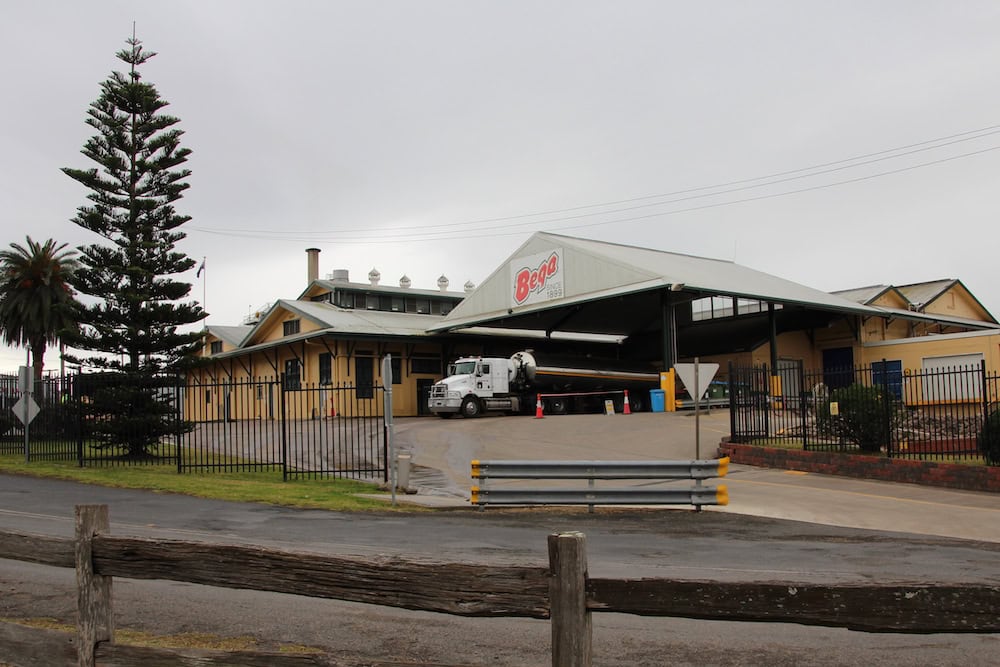
“I’ve been a dairy farmer for a long time, and it takes a long-term strategy to significantly lift your own farm’s supply, and out of that will come confidence. I think we are beginning to see the first shoots of optimism,” Barry said.
“It is not just about one thing. I think it is about a number of things, but it starts with how upbeat farmers are feeling about their industry and how confident they feel about the future.”
Whilst Bega Cheese wasn’t among the processors to implement price clawbacks, Barry says that he supports anything that promotes confidence in the dairy industry.
“From a Bega Cheese point of view, we are very happy with the mandatory code. We had no problem in complying with it because it reflects our behaviour.
Bega never initiated a clawback that created the need for the code, and we weren’t the only one,” he said.
“It was a couple of unfortunately very large companies that did this, and the sad truth is the processing sector got tarred with the same brush over something that we disagreed with as strongly as the farmers did.”
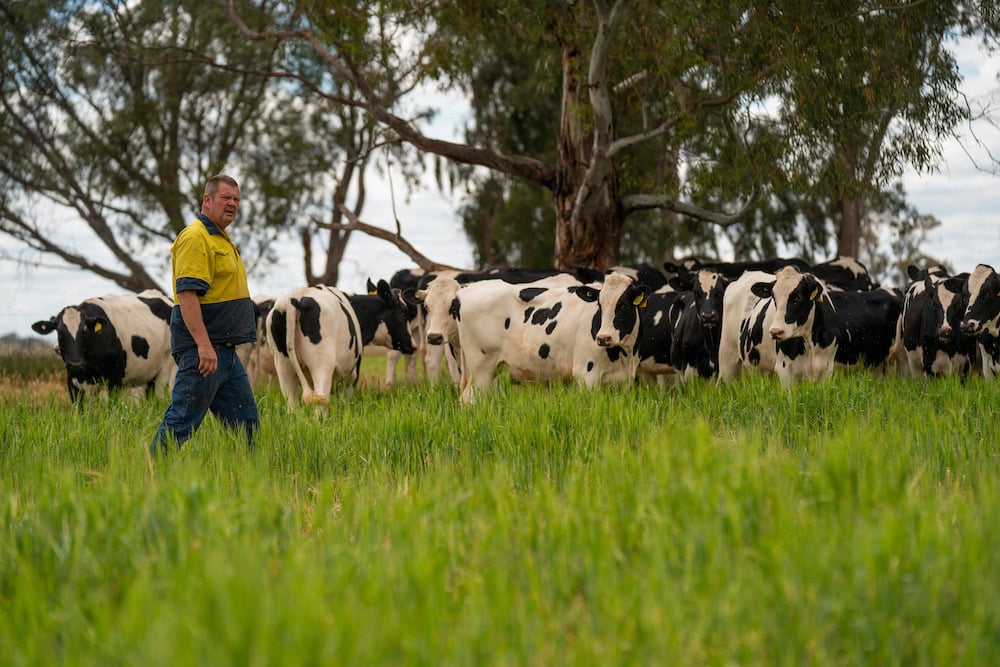
Looking ahead, Barry points to strong competition for milk with genuine growth in milk-based beverages, yoghurt and cheese.
“At the moment global supply and demand is in pretty good balance. If anything, demand looks a bit stronger than supply and this has its inevitable outcome as it improves the return you get for milk, so this is a good story for farmers,” he says.
“There will still inevitably be some volatility as it occurs around the world with good seasons in the northern or southern hemisphere, but supply and demand are balanced.
“I’m not an economist, but you could say that some of the market indicators are good domestically and they are good internationally, but circumstances can change.”
Times are changing
A fresh approach to the dairy industry will ensure Aussie consumers can enjoy the milk, cheese and yoghurt they love long into the future, with NSW Farmers playing a leading role in advocating for farmers.
NSW Farmers was crucial in ensuring calls for price fairness were heard in kitchens and breakfast tables right around the country, and the association is now adding a new Dairy Manager role to deliver specialised policy advice and advocacy, coinciding with the release of the state government’s NSW Dairy Industry Action Plan. The Action Plan, developed by NSW Fresh Milk & Dairy Advocate Ian Zandstra with input from NSW Farmers, was aimed at creating a fairer system while also investing in the future of the sector.
NSW Farmers Dairy Chair Colin Thompson said the association was a key part of reshaping the leadership of the dairy industry at state and federal levels, and this new Dairy Manager role would ensure farmers would continue to be involved in the implementation of those plans.
“The dairy industry has had a number of challenges and setbacks over recent decades, from drought to absurdly low milk retail prices,” Mr Thompson said.
“The dairy industry needs coordinated advocacy as it faces old and new challenges, from processor and retailer relationships to competition from plant-based alternatives, high energy prices and environmental changes.
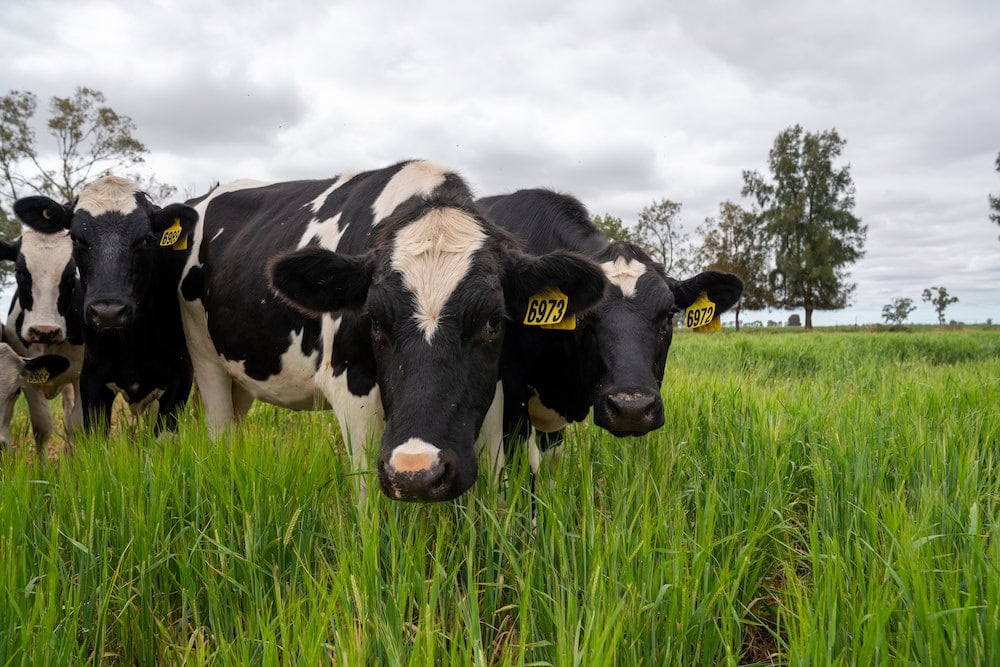
“It’s time for meaningful action and NSW Farmers looks forward to the chapter ahead.”
Mr Thompson welcomed the emphasis on research, development, extension and adoption programs aimed at unlocking higher productivity and profitability, de-risking the dairy industry, and developing new markets.
“NSW Farmers has been a key player in the development of this Action Plan, primarily through our advocacy and our role on a state industry advisory panel,” Mr Thompson said.
“We pushed for the installation of a NSW Dairy Advocate, and we were successful in seeing that come to fruition in 2019, and now NSW Farmers will be one of the handful of stakeholders on the Dairy Action Implementation Panel, established to oversee the implementation of the Action Plan.”
If you enjoyed this feature on the dairy industry, you might like to read our story on our lettuce industry.




